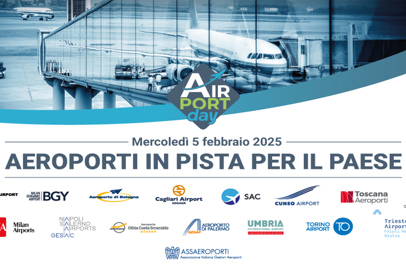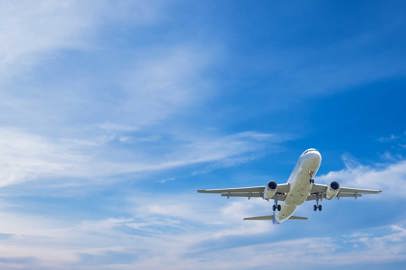30 June 2018
Air traffic control
Interview with Maurizio Paggetti, Director of Air Navigation Services of ENAV
The company managing civil air traffic in Italy is ENAV, which guarantees the safety and punctuality of almost 1.8 million flights a year with a peak of 6,575 flights a day thanks to its Control Towers. With ENAV, airlines can fly all over Italy safely 24 hours a day, 365 days a year.

We spoke to Maurizio Paggetti, Director of Air Navigation Services of ENAV, to discover the company’s services, activities, mission and vision.
In addition to air traffic control activities, what other services for the safety of air traffic does ENAV provide?
"In addition to controlling and managing air traffic, ENAV also plays a strategic role in airspace design. This activity of primary importance is performed by the company to guarantee that the air space is utilised in the best way possible during the en-route stage and to make routes more efficient for the approach stage towards the airports. This activity is just one of many outstanding consultancy services that ENAV offers the international market.
Another service is that of Aeronautical Information, an activity that is indispensable for correctly and swiftly managing a flight. ENAV, through its subsidiary Techno Sky, directly handles the Management and Maintenance of all software systems and platforms used to guarantee full operational efficiency in a seamless manner. This unique wealth of skills, technology and experience ensures that the entire sequence of activities necessary for flight assistance are implemented and performed.
In this perspective, ENAV also performs, with its own fleet of Piaggio Aero P180 Avant II aircraft, a radio frequency measurement service, which controls domestic radio navigation aids: devices that use signals to provide the pilot with information, on on-board instruments, on the position of its flight on both the horizontal and the vertical plane, providing a continuous verification of the accuracy of signals, which enables air transport operators to fly in maximum safety. ENAV provides a Meteorology service from the Weather Forecasting Unit in Rome and Milan, where a team of meteorologists produce forecasts that are valid for 9, 24 and 30 hours. The airport weather stations, instead, issue bulletins every hour or half hour. Observations and weather forecasts are issued in real time on international telecommunications networks. ENAV is the only Italian company authorised to select, train and update professionals working within civil air traffic control services.
The professional training and updating activities are performed through the Academy, which is an aeronautical education centre of international standing, whose aim is to provide high-level specialist training that complies with educational standards and national and international technical regulations in the sector."

Control Tower of Rome Ciampino Airport
The first quarter of 2018 saw good performance in terms of air traffic growth, with an increase in en-route traffic (conventional measurement that takes into account the weight of the aircraft at take-off and distance covered by the same) of 7.6% over Italian skies compared to the same period in 2017.
What is this continuous increase traffic volume due to?
Could it cause a greater risk to safety and flight control?
"Safety is ENAV’s main mission. It is the true core business. We are equipped from a technological point of view and in terms of operational staff to guarantee even higher volumes of air traffic. The increase in traffic, in a context of international growth, was facilitated by the introduction of the Free Route, a procedure that allows aircraft flying above 9,000 metres to plan the best route along a direct path from an entry point to an exit point within Italian air space. This innovative procedure allows airlines to fly a direct route without any flight path restrictions, with benefits in terms of flight efficiency and a reduction in fuel consumption, and, subsequently, the generation of environmentally less harmful emissions. The adoption of the Free Route, therefore, four years ahead of time compared to the provisions of European legislation, attracted more traffic over Italian skies."

For years ENAV also supports the environment by being committed to optimising routes and flight times, and to reducing fuel consumption and CO2 emissions of aircraft.
How do you develop your Flight Efficiency Plan?
"The Flight Efficiency Plan (FEP) is a multiyear plan created by ENAV which, by optimising the structure of the air network, reduces flight times, fuel consumption and emissions of CO2 from aircraft. In 2017, with the Free Route above 11,000 metres, the airlines crossing national air space saved 30 million kg of fuel with less CO2 emissions of 95 million kg. It should be considered that of the over 1.8 million movements ENAV managed in 2017, 30% were flights that only crossed the country and, therefore, didn’t land or take off from an Italian airport."

How do you think air transport will evolve in the near future in Italian air space and, more generally, worldwide?
"Harmonising air traffic across the continent is a fundamental mission for the regulator and all service providers. ENAV - in close coordination with the European Commission and with various sectors in the world of Air Traffic Management - participates in many projects concerning research and development, experimentation and validation of new technologies and procedures that aim to improve the performance of the European air navigation system.
The SESAR (Single European Sky ATM Research) and Horizon 2020 programmes are strong community incentives to provide the single European sky with the technological elements to overcome national fragmentation and pool all research and development efforts in Europe, while placing the human factor at the centre of the project.
With regard to sector evolution, I’d say we are moving toward increasing digitalisation of systems and the implementation of remote towers which guarantee the same levels of safety and functioning, but with greater service provision efficiency."

What projects are you implementing to control flights and air space in the future?
Do satellite surveillance systems represent the future of the sector?
"Satellite surveillance is certainly the future, and is already imminent, thanks to Aireon.
Aireon, a US company in which ENAV holds a minority share, is creating the first system of satellite surveillance for air traffic control with global cover. To date only 30% of the world is covered by radar systems, but the new Iridium Next constellation of 66 satellites will provide surveillance data and automatically transmit information from aircraft regarding their position all over the world.
Currently, after the fifth launch, there are 50 satellites in orbit, meaning that total cover is close, which will guarantee the safety and efficiency of the entire air transport sector worldwide.
In addition, the only prototype experimentation centre for validation of the Aireon signal in Europe is headquartered at ENAV’s Area Control Centre in Rome, a crowning achievement for ENAV and for the future of Air Traffic Management."
Text by Angela Trivigno
Published on Avion Tourism N67/2018
Photos: Enav
Copyright © Sisterscom.com
You might be interested in
Useful Info

Authority
Olbia Airport will be named after Prince Karim Aga Khan IV
ENAC pays tribute to the founder of modern tourism in Costa Smeralda: a key figure in the history of aviation and the development of Sardinia
Useful Info

Authority
Airport Day
The national event, organized by Assaeroporti, is held on February 5 to celebrate the strategic role of the 17 participating Italian airports
Useful Info

Authority
ENAC: reorganization and future challenges of air transport
At the 2025 Meeting, a discussion on innovation, sustainability, innovative air mobility and quality of services, in line with the country's strategic objectives

